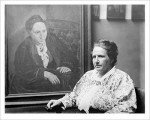Letter from Berlin: Generalizations about Germans
Usually, I scrupulously avoid making generalizations about Germans. That’s because the standard national stereotypes only distort our understanding of real people and, anyway, most of the Germans I’ve come to know in the decade or so that I’ve been living part-time in Berlin don’t really fit into the popular characterizations of Germans you see on old American TV sit-coms. All that "Achtung! Dat eez ferry inter-rezting" stuff just doesn’t cut it. Maybe that’s because the people I know are atypical or because, as anyone German who does or doesn’t live here will tell you (or warn you), Berlin is different from the rest of the country. It’s so different that a recent German movie is titled in English, Berlin is in Germany, as a play on the general denial of that claim.
But it’s the summertime Silly Season and last week people made some generalizations about Germans which are getting a lot of attention in the Berlin tabloids. Usually the people offering stereotypes about Krauts are the Brits, and most of the time it has something to do with soccer rivalries between Limeys and Germans. But the current demeaning caricatures come from, of all people, the Italians.
Here’s what happened. Last week, Silvio Berlusconi, the Italian prime minister and leader of his country’s capitalist mafia (as distinguished from other Italian mafias), began his 6-month term as head of the rotating leadership of the European Parliament. It was an occasion anticipated with some chop-licking by the media, since Berlusconi has a reputation as a thug in a China shop. The Italian PM didn’t disappoint. After being subjected to some heckling by Martin Schulz, a German MP, Berlusconi shot back that Schulz would be perfect to play the part of a "kapo" in a movie about Nazi concentration camps.
Naturally, the Armani hit the fan at that point. The tabs in Deutschland immediately proclaimed in announcement-of-war sized headlines that the Italians were calling the Germans Nazis. Berlusconi said it was a joke, but refused to apologise. German Chanceller Gerhard Schroeder did a bit of soft-shoe shuffling to defuse the commedia dell’arte crisis. He and the Italian "capo" had a private telephone conversation, and Schroeder told the press afterwards that Berlusconi had made nicey-nicey. Schroeder didn’t really have his heart in this made-for-tabloids tempest. He already has enough on his plate with a tanked German economy and a dodgy "reform plan" to bring in tax cuts and cut worker benefits.
So, end of kafuffle? No way. Berlusconi held his own press pow-wow and said he hadn’t taken anything back. At which point, the opponents were expected to return to their corners and sulk, leaving the scholastic interpreters to decipher the entrails. Still, that wasn’t enough. Along comes Stefano Stefani, a heretofore unheard of Italian junior tourism minister who decided to announce to all and sundry that German tourists are nationalistic boors who "invade Italy’s beaches" every summer. In addition to describing Germans as "blonds with hypernationalist pride who have always been indoctrinated to be first in the class at any cost," Stefani took a swipe at Schulz for good measure. The German MP, he said, "probably grew up taking part in noisy burping contests after drinking gigantic amounts of beer and eating large amounts of fried potatoes."
More Armani hit the fan. (By the way, the New National Gallery in Berlin is currently holding an "art" exhibit of Giorgio Armani’s clothes. Go figure.) "If I were the Italian head of government," said German interior minister Otto Schily, who takes his vacations in Italy, "that man would no longer be in office." German economics minister Wolfgang Clement pitched in, saying Stefani should "be taken out of circulation."
Poor Chancellor Schroeder. He was on the verge of taking his annual holiday–to Italy, where else? This week, his spokesperson announced that the Schroeders were cancelling their Italian vacation plans and would stay at home, in Hannover, a summer fate some might regard as worse than death.
Actually, the Italians are playing with suntan oil fire here. As one economist pointed out, 40 per cent of all summer tourists to Italy come from Germany and account for about 10 billion dollars in the Italian GDP. Be careful of who you stereotype may be the moral of the story.
All of which silliness set me to thinking. Are there any generalizations about Germans and life in Germany that bear some resemblance to reality? Well, yes, I suppose so. However, the first things I noticed when I first came here seemed to demonstrate just the opposite. For example, having been raised on documentaries featuring the spittle-spewing, guttural speechifying of greater and lesser Nazi Furhers, I was surprised, upon hearing Germans actually speak their language to each other, that German is pronounced far less harshly than the "Achtung!" stereotypes would have you believe. It is true that the German sentence can go on (and on) before you get to the verb at the end, but its sound is quite tranquil, even soft. And in defense of involuted multi-clause German grammar, one German friend told me that he experienced the short, punchy English sentence as similar to "suddenly bumping your nose up against a plate-glass window you didn’t know was there."
Second, although I’d heard of the German passion for "order," I hadn’t heard of the German self-mockery of order. But early on, I was riding a crowded escalator in a Berlin department store, and when one middle-aged person grumpily tried to get by some young people who were blocking his way (the custom is: stationary escalator riders stand on the right, moving escalator walkers proceed on the left), a young person turned to the grouch who was loudly complaining and went, "Heil Hitler!"–i.e., mocking the man for his all-too-stereotypical insistence on rule-following obedience. All of which made me more cautious about generalizations about Germans.
But there are a few, if not generalizations, at least differences between Germany and North America that I think hold up. When they’re not unemployed (and these days, millions are), you notice that German workers, togged out in blue or white overalls, tend to have an old-fashioned pride in being workers. That is, being a worker, and having your overalls dirty, is still an honourable station in German life. Quitting time or "Feierabend," as it’s known, is still a big deal, and when my roofworker pal Alex turns up at our local watering hole after a day on the job, that first beer is considered well-deserved. By comparison, a good deal of visible worker culture, and its valuation, has pretty much disappeared in North America.
Another generalization that’s true is that Germans read more than North Americans. Or at least, they more visibly read more. Books are still objects of respect in German culture. When you ask someone who doesn’t read much if they read books, they mumble, "Sometimes," and it’s clear that not-reading is still considered slightly shameful. When you ride the subway, the per capita number of people reading books, newspapers, magazines, or even the packaging instructions on something they’ve just bought at the store (usually some computer gizmo) is strikingly higher than to be seen on North American skytrains and undergrounds. However, things are changing, and Germany is "catching up" with proudly illiterate America. TV screens have now been installed on the subway cars and, increasingly, people gaze blankly at the news slide shows and movie clips that are offered on the ride home.
If Germany seems more literate than North America, it’s also more loquacious. There’s the aforementioned German sentence but, beyond that, there’s just more conversation. If you’re planning to meet someone at a cafe for a "good talk," block out 2 or 3 hours in your datebook. Even saying goodbye can run to 10 or 15 minutes. You say goodbye, and then the other person brings up something else, and you chew on that for a bit, and then there are a couple more tentative farewells and more last minute thoughts. In Germany, parting is still such sweet sorrow. However, that’s changing too. With the ubiquitous cellphones and the astronomical bills you can pile up on them, Germans are learning to cut it short. The current catchphrase to keep telephone conversations terse is, My Accu (account) is almost empty.
It’s also generally true that there are less available shopping hours in Germany than in America. In contrast to 24/7 North American supermarkets, in Germany shopping ceases at 8 o’clock on weekdays. There’s a half-day on Saturday, and on Sundays, everything is closed except for cafes, restaurants and other pleasure sites. Until a year or so ago, shopping shuddered to a halt at 6 p.m. on weekdays, and 2 p.m. on Saturdays. It took a vote in the national parliament to extend the hours, after lots of complaints that workers getting off the job at 6 had no time to buy groceries. This year, Saturday shopping is extended to 8 p.m. as well.
Reduced shopping hours means that "pleasure," apart from shopping, still has a place in German life. In fact, Sundays are generally taken fairly seriously. There’s a sense of obligation that one ought to do something officially pleasurable on Sundays, like taking a walk in the park or a bike ride in the countryside. What’s more, the obligatory pleasure is heightened if the activity has an edifying aspect–like going to a museum. Other generalizations connected to Sunday and other pleasures include: at 4 o’clock in the afternoon, thousands of Germans can be found coffee-drinking and having a slice of cake. It’s equivalent to the English tea. Also, Germans seem comfortable moving around in herds. So, it’s not just schoolchildren being trotted off in groups to public sites, but groups of adults are frequently led about on public walks by docents who point out the historical sites of interest. It’s part of an old cultural tradition of clubs or "Vereins" for doing things together. There’s also a lot of fawning over dogs–at least in doggie towns like Berlin. People have cats, but it’s the dogs who get cooed over in public with the same affection accorded to babies. On cultural dog matters, Germans are still behind North Americans when it comes to carrying plastic Ziploc bags to pick up their own hounds’ doggy poop. Finally, Germans appear to be more comfortable in their skins than North Americans. There’s a nudity tradition here that goes back more than a century. It’s known as "Freie Koerper Kulter" (FKK), or "free body culture." In parks and at ponds and lakes all over the city, you find naked people everywhere. Even conservatively-minded people regard public nudity as completely normal.
As becomes quickly obvious, all these true generalizations about Germans are slightly disappointing. That’s because we expect national generalizations to point up striking eccentricities. Italians are volatile, Scots are dour, that sort of thing. But real generalizations, which require anthropological observation, just don’t have that character. They’re simply interesting. That’s because anthropology is different from propaganda or Silly Season stereotypes.
Berlin, July 10, 2003


